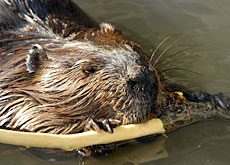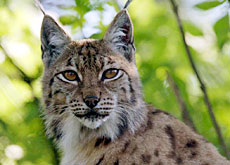Swiss aim to boost beaver count

Pro Natura, the country's leading conservation agency, says beavers should once again feel at home in Switzerland, and wants to expand beaver-friendly habitats.
A new campaign aims to build up the network of natural rivers and streams, which it says will benefit not only the dam-building rodents but also many other species.
Pro Natura said in Bern on Monday that its aim of laying down a “red carpet” for beavers of natural waterways between the Rhine and Rhone rivers would help beaver numbers increase.
The Hello Beaver! campaign is one of the most significant protection programmes in Switzerland, according to the organisation, as places where beavers settle are seen as ecologically healthy and attractive for many other endangered species.
At present only one in ten Swiss waterways is natural – the rest have either been blocked up, dammed or turned into canals or artificial drains to deal with flooding.
The beaver went extinct in Switzerland in 1805 but returned in the middle of the 20th century. There are estimated to be 700-900 beavers currently with Swiss residency.
Beaver exhibitions
The project’s leader, Urs Leugger-Eggimann, said this success was partially down to an environmental project launched near Basel in 2000 to fight for more natural and semi-natural rivers and streams, calling for this success to be expanded nationwide.
He said that by 2008 at least two regional projects should be established and bigger networking schemes set in motion.
Leugger-Eggimann also laid out a three-point strategy for boosting the number of beavers in Switzerland.
The organisation wants to work with riverside power stations to open the so-called “beaver barriers” that such utilities often build.
It seeks cooperation with cantonal authorities and communities to ensure that the beavers’ habitat be preserved and riverbeds and sections of riverbank be restored to their natural state.
It also aims to raise awareness of beavers through excursions, exhibitions and school trips.
Leugger-Eggimann pointed out that the campaign and more natural rivers would benefit not only beavers but also many other species of flora and fauna, including dragonflies, kingfishers and trout.
swissinfo with agencies
Numerous rivers and streams dry up periodically as a result of water withdrawals. Since 1992, legal requirements have existed concerning the minimum amounts of water – or residual flow – to be maintained in streambeds downstream of a withdrawal site.
Over-harnessing of water upstream is thought to dry up rivers and have a harmful effect on plants and wildlife.
Pro Natura is the largest conservation organisation in Switzerland. Founded in 1909, it has an annual turnover of SFr12 million ($9.9 million).
Beavers are best known for their natural trait of building dams in rivers and streams, and building their homes (lodges) in the resulting pond.
They are the second-largest rodent in the world after the capybara.
Beavers continue to grow throughout life. Adults weighing over 25kg are not uncommon. Females are as large as or larger than males of the same age, which is uncommon among mammals.
The beaver went extinct in Switzerland in 1805, but returned about 50 years ago. There are currently an estimated 700-900 beavers in the country.

In compliance with the JTI standards
More: SWI swissinfo.ch certified by the Journalism Trust Initiative



You can find an overview of ongoing debates with our journalists here . Please join us!
If you want to start a conversation about a topic raised in this article or want to report factual errors, email us at english@swissinfo.ch.